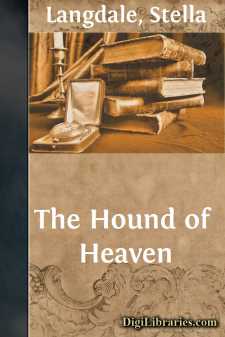Categories
- Antiques & Collectibles 13
- Architecture 36
- Art 48
- Bibles 22
- Biography & Autobiography 813
- Body, Mind & Spirit 142
- Business & Economics 28
- Children's Books 17
- Children's Fiction 14
- Computers 4
- Cooking 94
- Crafts & Hobbies 4
- Drama 346
- Education 46
- Family & Relationships 57
- Fiction 11829
- Games 19
- Gardening 17
- Health & Fitness 34
- History 1377
- House & Home 1
- Humor 147
- Juvenile Fiction 1873
- Juvenile Nonfiction 202
- Language Arts & Disciplines 88
- Law 16
- Literary Collections 686
- Literary Criticism 179
- Mathematics 13
- Medical 41
- Music 40
- Nature 179
- Non-Classifiable 1768
- Performing Arts 7
- Periodicals 1453
- Philosophy 64
- Photography 2
- Poetry 896
- Political Science 203
- Psychology 42
- Reference 154
- Religion 513
- Science 126
- Self-Help 84
- Social Science 81
- Sports & Recreation 34
- Study Aids 3
- Technology & Engineering 59
- Transportation 23
- Travel 463
- True Crime 29
The Hound of Heaven
by: Stella Langdale
Categories:
Description:
Excerpt
The Rev. Mark J. McNeal, S. J., who was one of the successors of Lafcadio Hearn in the chair of English Literature at the Tokyo Imperial University, in an interesting article recounts the following incident of his experience in that institution. "I was seated on the examining board with Professor Ichikawa, the dean of the English department... There entered the room a student whom I recognized as among the best in the class, a sharp young chap with big Mongolian eyes, and one who had never to my knowledge given any hint of even a leaning toward Christianity. I remembered, however, that his thesis submitted for a degree had been a study of Francis Thompson. Following the usual custom, I began to question him about his thesis.
"'Why did you choose Thompson?'
"'Well, he is quite a famous poet.'
"'What kind of poet is he?'
"'We might call him a mystic.'
"'Is he a mystic of the orthodox sort, like Cynewulf or Crashaw; or an unorthodox mystic, like Blake or Shelley?'
"'Oh, he's orthodox.'
"'Well, now, what do you consider his greatest production?'
"'Why, I should say "The Hound of Heaven."
"'Well, what on earth does Thompson mean by that Hound?'
"'He means God.'
"'But is not that a rather irreverent way for Thompson to be talking about God, calling Him a hound? What does he mean by comparing God to a hound?'
"'Well, he means the pursuit of God.'
"'Oh, I see, Thompson is pursuing God, is he?'
"'Oh, no. He is rather running away from God.'
"'Well, then, God is pursuing Thompson, is that it?'
"'Yes, that's it.'
Titanic glooms of chasmèd fears Page 45
'"But, see here; according to Thompson's belief God is everywhere, isn't He?'
"'Yes.'
"'Well, then, how can God be going after Thompson? Is it a physical pursuit?'
"'No. It is a moral pursuit.'
"'A moral pursuit! What's that? What is God after?'
"'He is after Thompson's love.'
"And then we, the Jesuit and the Buddhist, began to follow the windings and turnings of that wondrous poem, the most mystic and spiritual thing that has been written since St. Teresa laid down her pen. What the other member of the examining board thought of it all I never heard. But I think I acquired a satisfactory answer to that question so often put to me: Can the Japanese really grasp a spiritual truth? Do they really get at the meaning of Christianity? This, of a race that has produced more martyrs than any other nation since the fall of Rome and that kept the Faith for two centuries without a visible symbol or document!"
The incident supplies matter for other conclusions more germane to the subject of this essay. The late Bert Leston Taylor, a journalist whose journalism had a literary facet of critical brilliance, once declared that he could not perceive the excellence of Francis Thompson's poetry. When someone suggested that it might be that he was not spiritual enough, the retort was laconic and crushing, "Or, perhaps, not ecclesiastical enough." Like most good retorts Taylor's had more wit than truth. He was obsessed by the notion, prevalent among a certain class of literary critics, that Francis Thompson's fame was the artificially stimulated applause of a Catholic coterie, whose enthusiasm could hardly be shared by readers with no particular curiosity about Catholic ideas or modes of religion. It was probably this obsession which prompted that able critic, Mr. H. D. Traill, to write to Mr. Wilfrid Meynell when the "Hound of Heaven" first appeared: "I quite agree with you in thinking him a remarkable poet, but, if he is ever to become other than a 'poet's poet' or 'critic's poet'—if indeed it is worth anyone's ambition to be other than that—it will only be by working in a different manner. A 'public' to appreciate the 'Hound of Heaven' is to me inconceivable." Mr....


